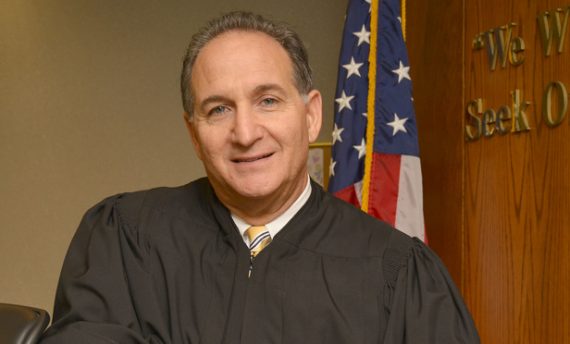
Miami-Dade County Judge Steve Leifman
(1-10-17) Who will president-elect Donald Trump nominate as the new Assistant Secretary for Mental Health and Substance Abuse?
Hearings begin today for the controversial big name cabinet posts so it will be a while before the Senate gets around to the White House’s choice for this new job in the Department of Health and Human Services, but four names already are being circulated on Capitol Hill.
Even before the $6.3 billion 21st Century Cures Act was signed into law last month (that’s the omnibus bill that contained mental health reforms), I began lobbying for Miami-Dade County Judge Steve Leifman.
The others being mentioned are Dr. John Wernert, who runs Indiana’s mental health system; Dr. Robert Heinssen, a program director at the National Institute of Mental Health; and Dr. Ellie McCance-Katz, the chief medical director in Rhode Island. Of course, other candidates might surface in the coming days and it’s also possible that Trump could pull a name out of hat that surprises everyone.
But I hope not.
It will take a strong, knowledgeable and accomplished leader to implement the hard-fought reforms that became law primarily because of Rep. Tim Murphy (R-Pa.) and Sens. John Cornyn (R-Tx.), Chris Murphy (D-Conn.) and Bill Cassidy (R-La.)
Rep. Murphy, who started the ball rolling four years ago after the 2012 attack at Sandy Hook Elementary School, recently outlined his goal. It’s to “deliver treatment before tragedy…(by) breaking down the wall between physical health and mental health… and (restructuring the federal government’s) $130 billion dollar investment (now being) wasted on feel-good fads that have done little to treat the ill as the rates of homelessness, incarceration, suicide and drug overdose deaths soar.”
That’s a tall order considering that Murphy’s subcommittee hearings revealed that 112 federal agencies currently deal with mental health and substance abuse issues and few bother to talk to each other. There are also strong differences of opinions about what constitute “feel-good fads that have done little to treat the ill.” At his hearings, Murphy repeatedly targeted the Substance Abuse and Mental Health Services Administration (SAMHSA) as an agency run amuck.
I’ve seen plenty of appointees arrive in Washington eager to shake-up a federal bureaucracy only to discover that it’s extremely difficult to change or eliminate a well-entrenched federal program. The new Assistant Secretary will need to be politically savvy – enough so to deal with SAMSHA’s management and a highly partisan Congress that currently appears more interested in frustrating the other side than cooperating. If those challenges aren’t daunting enough, the new Assistant Secretary will face stakeholders who disagree about what needs to be fixed. Consider the heated exchanges that erupted at hearings when Rep. Murphy introduced his first draft of his bill that called for loosening HIPAA regulations and punishing states that didn’t implement and utilize Assisted Outpatient Treatment.
This is why I am promoting Miami-Dade County Judge Steve Leifman for the newly created post. He has accomplished in his community exactly what needs to be done nationally. In 2000, he brought the county’s different and diverse stakeholders to the table and persuaded them to begin working together to reform what was one of the most horrific and complex mental health systems in the nation. Today, Miami-Dade County has become a nationally recognized and much honored success model.
Leifman has crisscrossed the nation advocating for jail diversion, Crisis Intervention Team training, mental health courts, and jail intercept and re-entry programs. But he’s wise enough to understand that it takes more than keeping ill individuals out of our criminal justice system to help them regain control of their lives. He serves on the board of the nation’s largest and most successful supportive housing organization, is on the board of the American Psychiatric Foundation, and is an enthusiast of job training, clubhouses, peer support services, and imaginative recovery programs. Under his leadership, Miami-Dade County is the first in the nation to investigate how predictive analytics can be applied to mental health and substance abuse services. In addition to working locally, he was appointed a Special Advisor on Criminal Justice and Mental Health for the Supreme Court of Florida. On November 19, 2015, he became the first Floridian judge to receive the William H. Rehnquist Award for Judicial Excellence from U.S. Supreme Court Chief Justice John Roberts – the highest honor that a judge can receive from his peers.
Because judges in Florida are non-partisan, Judge Leifman was able to get both Democrats and Republicans in the state legislature during its last session to pass the most sweeping mental health legislation in the state’s recent history.
Initially, Rep. Murphy insisted the new Assistant Secretary be a psychiatrist or psychologist. That’s because the Obama administration appointed a lawyer to head SAMHSA who appeared during congressional hearings to know little about serious mental illnesses. At one point, the entire agency didn’t employ a single psychiatrist. But that job requirement was deleted from the final bill.
I understand Rep. Murphy’s concern, but a degree in psychiatry doesn’t guarantee that an appointee knows how to motivate or manage people. It is also important to remember that while Florida judges have law degrees, they are nonpartisan and their job is to make decisions and resolve often complicated issues. That’s much different from an appointee who earned a law degree because he/she wanted to become a state or federal bureaucrat.
 Among the other top contenders, Dr. John Wernert, is quietly gaining widespread support on the Hill. He was chosen to manage Indiana’s state mental health system by Vice President-elect Mike Pence, when Pence was Indiana governor, and Dr. Wernert is credited by state mental health groups for doing an admirable job. Pence specifically put Dr. Wernert in charge of implementing Healthy Indiana Plan 2.0, an insurance plan that was an alternative to Obamacare. The Indiana plan has performed much better than other state run alternatives to the Affordable Care Act. The Indiana plan is well-regarded by Republicans because it requires participants to pay for some medical costs. Given that the Trump administration and Republicans have made replacing Obamacare a priority, and Dr. Wernert’s personal relationship with the Vice President, Dr. Wernert is considered to be a very strong candidate for the new post. In Indiana, he’s worked well with both sides of the political aisle and before being tapped for the state director’s job, he was medical director of the Midwest’s largest Catholic health care system with 13 hospitals, giving him ample managerial experience. He’s also well respected as a psychiatrist, having served as a former president of the Indiana State Medical Association, a 7,900 physician member group.
Among the other top contenders, Dr. John Wernert, is quietly gaining widespread support on the Hill. He was chosen to manage Indiana’s state mental health system by Vice President-elect Mike Pence, when Pence was Indiana governor, and Dr. Wernert is credited by state mental health groups for doing an admirable job. Pence specifically put Dr. Wernert in charge of implementing Healthy Indiana Plan 2.0, an insurance plan that was an alternative to Obamacare. The Indiana plan has performed much better than other state run alternatives to the Affordable Care Act. The Indiana plan is well-regarded by Republicans because it requires participants to pay for some medical costs. Given that the Trump administration and Republicans have made replacing Obamacare a priority, and Dr. Wernert’s personal relationship with the Vice President, Dr. Wernert is considered to be a very strong candidate for the new post. In Indiana, he’s worked well with both sides of the political aisle and before being tapped for the state director’s job, he was medical director of the Midwest’s largest Catholic health care system with 13 hospitals, giving him ample managerial experience. He’s also well respected as a psychiatrist, having served as a former president of the Indiana State Medical Association, a 7,900 physician member group.
Also mentioned as a potential choice is Dr. Robert Heinssen, Director of the Division of Services and Intervention Research at NIMH. He has been recognized by the APA for championing research on early psychosis, having played a key role in the development of the NIMH research project, Recovery After an Initial Schizophrenia Episode (RAISE). That project is considered groundbreaking because it has fundamentally changed the trajectory and prognosis of schizophrenia through coordinated and aggressive treatment in the earliest stages of illness. RAISE is designed to reduce the likelihood of long-term disability that people with schizophrenia often experience. It helps people with the disorder lead productive, independent lives. At the same time, it reduces the financial impact on the public systems often tapped to pay for the care of people with schizophrenia. Because he is a working researcher, he is popular with mental health grassroots groups. 
Dr. Ellie McCance-Katz, the only woman whose name is currently making the rounds, is chief medical officer for the state Department of Behavioral Healthcare, Developmental Disabilities and Hospitals in Rhode Island. She has held a number of teaching jobs at Yale, the University of Texas, the Albert Einstein College of Medicine, Virginia Commonwealth University, and the University of California San Francisco. But she is best known in Washington circles as a SAMHSA whistleblower. She became SAMHSA’s first chief medical officer in 2013 but left after only two years. In a critical essay published in the Psychiatric Times, Dr. McCance-Katz wrote that SAMHSA’s Center for Mental Health Services, which administers federal mental health programs, ignored serious mental illnesses and evidenced based practices in favor of feel-good recovery programs that were politically popular but did little to help persons diagnosed with debilitating disorders. She claimed that SAMHSA was openly hostile toward the use of psychiatric medicine, didn’t focus on helping the seriously mentally ill, and questioned whether bipolar disorder and schizophrenia were even real, arguing that psychosis is just a “different way of thinking for someone experiencing stress.”

Dr. Ellie McCance-Katz
It’s considered bad form and risky for potential nominees to openly seek or speak about being appointed. In past administrations, some who have lobbied for the job in public have found themselves being immediately rejected by administrations, presidents and Senators who do not want to be upstaged.
So don’t expect any of the candidates mentioned in this blog to say much if asked. Mental health groups, such as the National Alliance on Mental Illness, the APA, and Mental Health America also don’t generally come out and back a specific candidate because they don’t want to risk paying a price if they endorse the wrong nominee.
But if you have a preference, you should contact the offices of Rep. Murphy or Sens. Cornyn, Chris Murphy, Bill Cassidy or Senate Majority Leader Mitch McConnell Jr., from Kentucky. You might even try tweeting President Trump.
Many of you have fought hard for the mental health reforms in the 21st Century Cures Act. Whether or not those changes will be implemented will depend on who the Trump administration nominates and the Senate confirms as Assistant Secretary.
Let your voice be heard.



